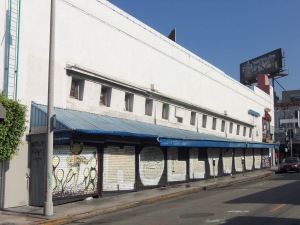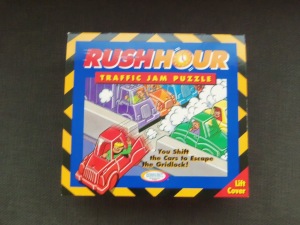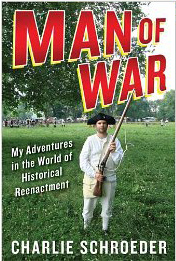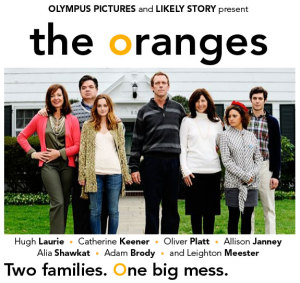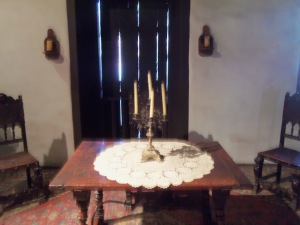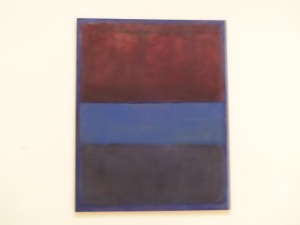We went down to LA last weekend to see our friend Jessica’s play reading at the Open Fist Theatre in Hollywood. One of the great things about LA is the 99-seat house. Equity actors are allowed to perform in non-union theaters if they are less than 100 seats. There must be hundreds of these theaters in LA. You can see great plays and great actors in an intimate setting at very little cost. Jessica’s play is about a place very familiar to Paul and me. Thankfully, only one of the characters is really close to reality, and she is no longer living. One of the actors was O-lan Jones, who would be familiar to Magic Theatre audiences. She was a real standout. We were relieved not to see ourselves in any of the characters!
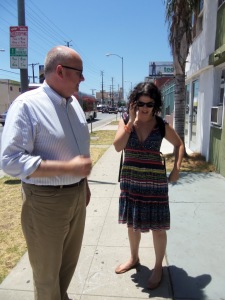 |
| The playwright outside the theater |
We stayed downtown at Checkers, which was once a posh hotel. I think it was like a sister to Campton Place in SF. It has been kept on life support by big chains and is now a Hilton. But the beds are good, and I love sitting in the rooftop hot tub and looking at the highrise towers above me.
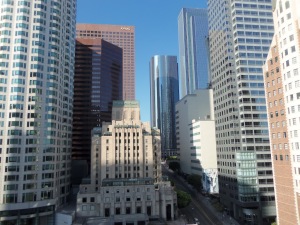 |
| View from the jacuzzi |
One of the weird LA mashups was driving out to Monterey Park and going to a Chinese restaurant in a mall where all the businesses are Chinese. There are few English signs, and they are usually misspelled. The best part was that the architecture was High Taco Bell. Really the most hideous fake Mission Revival (which is kind of fake even when it’s good) highlighted by neon. This topped off (or bottomed off?) by a surface parking lot and two-level subterranean parking garage that brought to mind that splendid kids’ puzzle Rush Hour. Once we got upstairs, there was a band on the other side of the screen playing for a wedding. A wedding attended by maybe a dozen people. That said, the duck was quite good.
We got to chat with Charlie Schroeder, whose new book, Man of War, sounds hilarious.
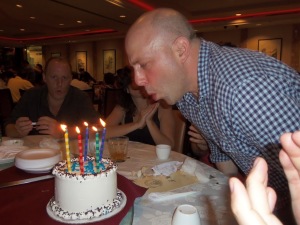 |
| The screenwriter blows out his candles |
We were in China celebrating our buddy Ian’s birthday. While we are name-dropping, we have to mention that Ian’s movie The Oranges, starring Hugh Laurie, comes out October 5. Welcome to New Jersey.
Our good buddy Johnny took us to the farmers market on Ivar in Hollywood on Sunday. It’s huge! A real town square. One of our favorite bookstores of all time, Hennessey & Ingalls, has a branch in a little retail center that was repurposed from some kind of warehouse. And of course we got to see the rear end of Crossroads of the World, another great LA mashup! Funky fantastic.
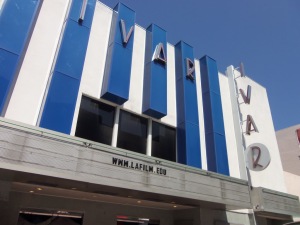 |
| The Ivar Theater along the farmers market |
 |
| The market |
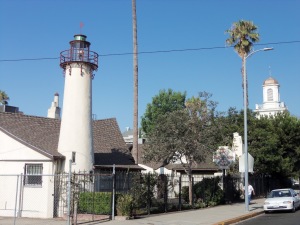 |
| The rear end of crossroads of the world |
Back downtown, we wandered around a bit and were pleased to see so many people living in converted office buildings. There is still a paucity of good restaurants and food emporiums, but there is no lack of dog walkers—always a sure sign of gentrification. Certain pockets are still just empty, and other pockets are still scary. Pershing Square is really bad. Legorreta’s bold colors don’t do much for the homeless.
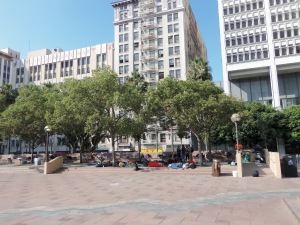 |
| Pershing Square |
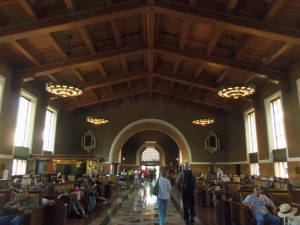 |
| Union Station |
We took the subway to Union Station, which was packed. It is the first time I ever saw it full of people, just as it is supposed to be. The ticket area was closed off, and Paul and I thought it would make a great setting for “The Ghost Train.” The old Harvey House restaurant is still empty, just like it was when my buddy Kristina first showed it to me in the late 1970s. Apparently, it is leased out for special events and photo shoots. The tile floor is divine. Here is a blog post about the space. http://laplaces.blogspot.com/2010/02/union-station-harvey-house.html
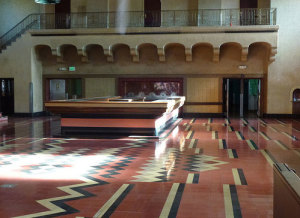 |
| CA Union Station – the old Harvey House Restaurant |
Across the street from Union Station is Olvera Street, the perfect alley of cheap crap. Despite the hideous trinkets, I love the scale. This time, we wandered into the Avila Adobe, which gives a sense of how LA’s earliest Spanish settlers lived. I especially enjoyed the scale of the courtyard.
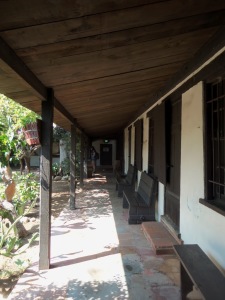 |
| Avila Adobe |
Although Frank Gehry has been overexposed, his Disney Concert Hall is still beautiful, at least on two sides. The Chandler and the Mark Taper Forum brought people back downtown in the 1960s, and the Disney Concert Hall extended that possibility into the new century. Just down the street, Arata Isozaki’s Museum of Contemporary Art never quite achieved the same level of significance. After the expensive, postmodern, mostly subterranean showpiece was completed, most folk said they preferred the Temporary Contemporary, a former police car warehouse reshaped by Frank Gehry. That was where most of the fun took place.
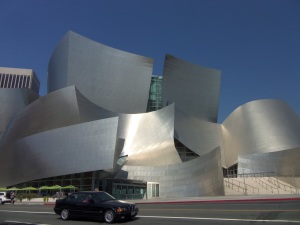 |
| Disney Concert Hall |
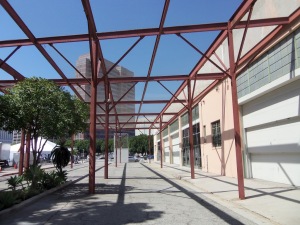 |
| Temporary Contemporary |
My favorite show in the Temporary (now known as the Geffen Contemporary, although most members still call it the Temporary) was the one in 1989 about the Case Study Houses called “Blueprints for Modern Living,” curated by Elizabeth Smith. As I have written before, I think this show was the catalyst for reexamining midcentury modernism. It sure brought Julius Shulman out of his Soriano lair in the Hollywood Hills. The staff used the space beautifully, rebuilding two Case Study Houses and the living room of the Eames House (not quite the re-creation we saw recently at the Los Angeles County Museum of Art, but cool nonetheless). At MOCA up the hill, I count a wonderful Ad Reinhardt show and a Robert Irwin retrospective in the 1990s as two of my favorites. MOCA started life as the museum that artists supported. Back then, LACMA was kind of fuddy duddy.
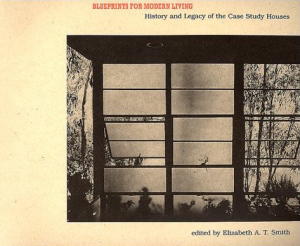 |
| Blueprints for Modern Living: History and Legacy of the Case Study Houses by Elizabeth A. T. Smith |
So it’s sad to see MOCA in such trouble. There was an enormous show called “The Painting Factory: Abstraction after Warhol,” and while I really liked the Mark Bradford and Tauba Auerbach canvases, I really can’t be bothered with the Andy Warhols. He is one artist who really suffers from overexposure. Rather like Salvador Dali. Director Jeffrey Deitch appears to be favoring a kind of safe avant garde. And some folks feel that he has made a Faustian bargain with tract house mogul Eli Broad. The prediction is that Broad will eventually take over MOCA and fold it into his own Broad Museum (with a new building by Diller Scofidio + Renfro under construction now).
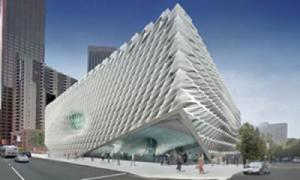 |
| The Broad |
Over at the County Museum, director Michael Govan was willing to disagree with the mighty mogul, and after his namesake building was finished, Broad picked up his marbles and moved downtown. Strangely enough, this seems to have served the County Museum well. They are much freer to pursue all kinds of different avenues and have now become the preferred museum for artists. Although it was the Temporary that put on the Michael Heizer show in its early days, it is the County Museum that got the rock.
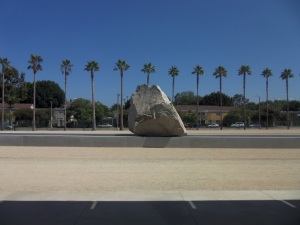 |
| Levitated mass by Michael Heizer |
In the last year, the County Museum exhibit “Living in a Modern Way” bookended the Case Study House show from 20 plus years ago. And their reconstruction of Ed Kienholz’s “Five Car Stud” was one of the most disturbing and wonderful pieces to be seen in recent LA history.
Although I didn’t care for the “Abstraction after Warhol” show, I was relieved to see the Rothkos from the Panza collection front and center in their show of masterworks from the collection. I remember when these were shown at the Temporary and how they were barely lit. They just hummed. Count Giuseppe Panza’s gift must have been one of hope. Hope that this new museum would forge a brave new way in art. Maybe it will again one day.
